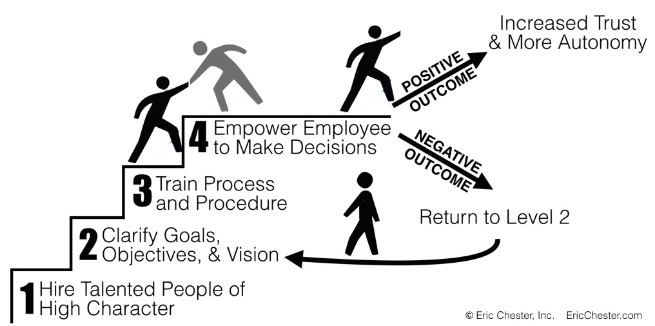Is being autonomous incompatible with being a team player? If you are the leader of a team or organization, do you want a group of autonomous players who will observe and act as they see fit or would you prefer to have a team that will not act without getting approval or gaining consensus first?
There may be industries or specific situations where gaining approval before moving forward is non-negotiable but, as Susan Fowler from the Ken Blanchard Companies points out, autonomy is one of the 3 psychological needs that every human being has. Therefore, it is critical to allow for some level of autonomy in order to create a self-motivating environment and a productive employee.
Is Total Autonomy Possible?
Everyone has someone to answer to so, realistically, total autonomy is not going to happen… and that’s okay… as long as the supervisor is providing good feedback and coaching.
Allowing for a certain level of autonomy is critical to the success of any organization. It allows people to do the job for which they were hired to do without the need for approval before moving forward.
If a supervisor feels they must be involved in every decision made by their direct reports, then they either have hired the wrong person or they are putting too much on themselves and possibly neglecting their own duties.
Improve Engagement
Another benefit of allowing for some level of autonomy is increased employee engagement which yields an additional benefit… strong levels of retention of high performing, high potential employees. Peter J. Martel, Senior Talent Development Consultant at Harvard Business School has worked with multiple organizations regarding human capital and he observed that, contrary to popular belief, compensation is not necessarily the best way to improve engagement. “Employees want to feel valued, and the best way to express that value is through investment in the individual”, he stated. This “investment in the individual” doesn’t have to be a direct financial investment. It can, and should, include a demonstrated interest in the employee’s professional development.
A recent Gallup report (Gallup Q12® Meta-Analysis Report) confirms the connection between employee engagement and productivity. “In businesses with highly engaged teams, profitability increased by 21 percent, sales productivity by 20 percent, and output quality by 40 percent…” This result comes when there is appropriate autonomy encouraged and there is sufficient feedback and coaching provided to either reinforce a productive decision or to identify the reason a decision didn’t work out as planned.
A lack of some level of autonomy also removes a sense of ownership from the individual for the final outcome of a project, which, most likely, will impact the quality of work.
Finally, giving people a sense that they are in control of their work-lives, even to a small degree, improves engagement, motivation and job satisfaction. The autonomous employee feels valued and empowered and will look for ways to get the job done better and more efficiently. They will take more pride in their work because they will own the result and that is reflected in everything they do.
But autonomy needs to be combined with good coaching in order to maximize positive growth for the individual and the organization.
Ken Sher is President of Sher Coaching and he is dedicated to improving individual and team performance by focusing on Career Management, Executive Coaching, and Leadership Development. If you would like to reach out to Ken to schedule a complimentary coaching session, please call him at (215) 262-0528 or email him at ken@shercoaching.com




